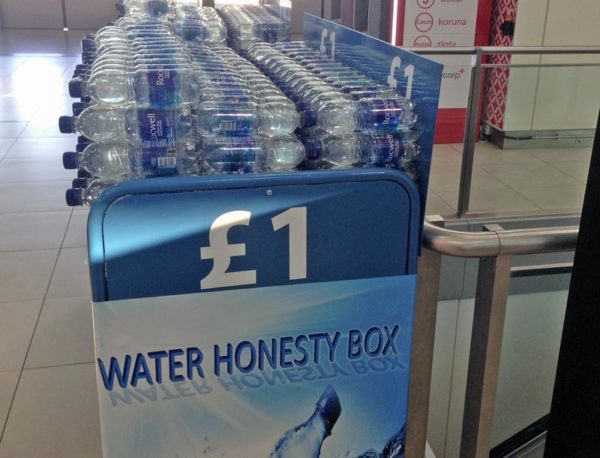
Following on from yesterday’s post. Is it rational to pay £1 for a bottle of water?
This photo was taken at Stanstead Airport. You could easily take a bottle without paying. No-one would notice at all. It’s not even clear it would be a crime. Therefore, is it rational to pay?
One logic is to consider the rational choice model as proposed by economists like Gary Becker. According to Becker, we commit crime if the benefits of crime outweigh the costs. In this case, the benefit is a bottle of water, and the cost of taking is virtually zero. There is zero chance of anyone saying anything if you didn’t pay. Therefore a rational economic person, who had little sense of community spirit (guilt) could rationalise taking a bottle without paying for it.
The utility of being a good citizen
Another way of considering the issue, is which would give you more utility – voluntarily paying £1 or sneaking a bottle? If you have a developed sense of conscience or public spirit, you would probably get more joy from voluntarily paying £1, rather than sneaking a bottle and then feeling mean-spirited.
Gift Exchange. The other way of looking at this is through the concept of a gift exchange. Economic anthropoligists, such as Bronislaw Malinowski or Marcel Mauss argue a key element of human society is the spirit of gift-giving and recipricocity. In this sense, we take the bottle as a kind of gift from airport but in return, we need to complete the circle and give a gift back. This gift exchange is potentially more fruitful than normal transaction.
Context of honesty box
It is also worth considering the context of this honesty box. It comes after airport security confiscates all your water bottles. When you get through customs you have to pay close to £2 in most shops to get a new water bottle. It makes the whole airport experience more irritating. (When in JFK, it cost me $5 to buy a bottle of water)
The airport is doing a good bit of PR – making water available at relatively cheap price (though still very profitable). If only 80% of people pay, they still make a profit and it kind of looks like they are doing passengers a favour. I would have paid a £1, but I had just bought a bottle from Starbucks for £2.50.
Free-Rider
The honesty box has scope for the free-rider problem. Suppose everyone volunteers their £1, but then the odd person starts taking for free. The airport will continue the tradition because it doesn’t mind if only 90% of people pay. But, if everyone starts free-riding on the efforts of others, the airport may decide to close down the scheme completely. Then we no longer have this extra option of water at £1, leading to a net-welfare loss.
A rational economic man may ignore long-term implications of the free rider problem, but if you are foresighted and care about future, you may make this a part of your calculation.
What would I do?
Definitely pay. The idea of taking a bottle without paying would defintiely cause me a cost greater than the benefit. The cost here is feeling of guilt/ and sense I’m not contributing to a better society.
It would only be rational to take without paying, if you have no costs relating to the intrinsic feeling of guilt. If we ignore mental attitudes, it could be rational to take without paying.
This shows that in calculating utility and economic decisions, we can’t just calculate easily measurable financial costs and benefits.
